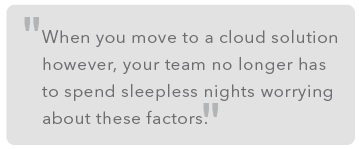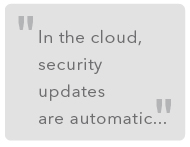Is the cloud safer than you think?
Do you lie awake at night worrying about the security of your company’s data? We know that data security is a top priority for executives and as more breaches in security like the Sony hack happen it is easy to become weary of the cloud, as one cannot be sure if it is secure enough to keep your data safe or if it will expose your company to even more risk.
However, if you look at your life closely you will find that you probably already trust the cloud with all kinds of sensitive and important information every day. Consider banking for example:
When was the last time you wrote a cheque? Although just a few years ago this was the only way to make payments (unless you paid in cash), in the modern world it is now virtually non-existent. Today when we think of how insecure cheques were and how easily they could get lost, damaged, stolen or forged we thank our lucky stars that we can now make payments simply and easily with online banking. Tracking payments and managing our accounts has become so easy and accessible we can do it from our mobile phone from virtually anywhere in the world.
We don’t spend too much time thinking about how all online banking data is stored and secured in the cloud. The ease of use and security means that it is at least, if not more, secure than physically having to go to the bank, write a cheque or pay your bills in cash.
You can think about the security of your business data in the same terms. Hosting all your company data on an internal server is often not more secure than the cloud. In fact, it is most likely more of a headache as you and your technical team have to constantly manage and maintain the physical infrastructure that comes with keeping your data on site as well as constantly ensure that your servers are secure.
According to one study it was found that while cloud security is a high priority for those who are thinking of moving to the cloud, once the switch to cloud services has been made it becomes far less of a priority. The study found that only 13% of seasoned users of cloud services list security as a concern. This is because once companies make the switch they quickly realise how secure their data actually is and how many additional benefits they gain from being in the cloud.
Here are a few more reasons why your company data might be safer in the cloud:
Built in Redundancy:
 If you still have a server room in your office where all your company data is stored that physical hardware is vulnerable to damage, theft, fire, power surges, hackers and more. In addition, your IT team probably spends a large portion of their time constantly trying to fix and upgrade outdated server infrastructure in order to keep your systems secure and functioning. When you move to a cloud solution however, your team no longer has to spend sleepless nights worrying about these factors.
If you still have a server room in your office where all your company data is stored that physical hardware is vulnerable to damage, theft, fire, power surges, hackers and more. In addition, your IT team probably spends a large portion of their time constantly trying to fix and upgrade outdated server infrastructure in order to keep your systems secure and functioning. When you move to a cloud solution however, your team no longer has to spend sleepless nights worrying about these factors.
Cloud systems are fully redundant and have automated disaster recovery. Redundancy means that there are always multiple copies of data, equipment and systems so that if one fails another can be used. Built in redundancy in cloud data centres means that customers have fully replicated data several times on multiple computers or units in the same data centre.
Cloud services are structured on the understanding that components within the system will sometimes fail. The most likely components to fail are physical discs, power equipment and memory units. This is why Enterprise Cloud (Virtual Data Centre) has redundancy in all aspects of the platform including power, connectivity, hosts and storage. By ensuring that all files associated with these physical components have multiple copies the cloud service provider protects clients’ data even if certain components sometimes fail.
Controlling access is more important than controlling location:
It often happens that employees need to take company data out of the office so that they can have access to it at home, while on a business trip or for a meeting with clients. When the company data is stored on an internal data server, employees will download and save company data onto their laptops or flash-drives to take with them out of the office. This makes company data vulnerable as laptops and flash-drives can easily be lost or stolen and are more easily accessible to hackers.
When data is stored in the cloud however, employees can access that data from anywhere and that access is more secure. If an employee’s laptop gets lost or stolen your data is still secure as access to the system is controlled by employee logins and passwords which can easily be changed. If a disgruntled employee leaves the company, you can easily lock them out of the system without having to worry what company data they may have copied onto their personal devices.
Enterprise Cloud (VDC) also has role-based access control so that you can allow different users to have different levels of functional access based on their role within the company.
Constant updates:
 Keeping systems secure takes constant work and hackers are so sophisticated now that it is becoming impossible for individual businesses to keep ahead of them. The fact is that keeping information systems secure takes a lot of work and it is often the case that cloud service providers are in a better position to keep up-to-date with the changes and control the risk than your team is when operating by itself.
Keeping systems secure takes constant work and hackers are so sophisticated now that it is becoming impossible for individual businesses to keep ahead of them. The fact is that keeping information systems secure takes a lot of work and it is often the case that cloud service providers are in a better position to keep up-to-date with the changes and control the risk than your team is when operating by itself.
In the cloud, security updates are automatic so it is easier to keep up with the pace of change and it protects you from the latest, more advanced threats.
While no system will ever be 100 percent secure, if you ask yourself the question of whether your data is more secure in the cloud than it is stored on your computer on an open Wi-Fi network, the answer invariably will be that the cloud has better security.
According to a survey by Intel the adoption of cloud services is about to reach a tipping point. Soon hosting and storing data on cloud infrastructure won’t just be a new fad. It will be a standard business practice.
It is also good to know that as more businesses make the move to keep their data in the cloud the more reasons and demand there will be for cloud service providers to ensure that cloud environments are secure. And because executives and businesses are concerned about data security in the cloud there are likely to be far more security protocols in place than in the traditional firewall set-up for enterprise solutions.
RSAWEB is South Africa’s leading cloud provider with over five years of cloud experience. If you want to schedule a demo or get more information on how your business can make the transition the cloud, contact us on
087 470 0000 or [email protected].
Read more articles about cloud solutions here:
How RSAWEB keeps Comair in the cloud
Moneyweb’s growth fueled by Enterprise Cloud






